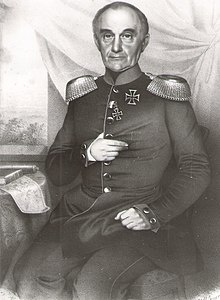Karl Wilhelm von Willisen
| Karl Wilhelm Freiherr von Willisen | |
|---|---|

Karl Wilhelm von Willisen
|
|
| Born |
30 April 1790 Staßfurt, Prussia |
| Died | 25 February 1879 (aged 88) Dessau, Anhalt, German Empire |
| Allegiance |
|
| Years of service | 1804-07, 1809, 1813-49, 1850 |
| Rank | Lieutenant General |
| Battles/wars |
Napoleonic Wars First Schleswig War |
| Awards |
Iron Cross Order of the Red Eagle |
Karl Wilhelm Freiherr von Willisen (30 April 1790 – 25 February 1879) was a Prussian general.
Willisen was born in Staßfurt as the third son of the mayor of Staßfurt, Karl Wilhelm Hermann von Willisen (1751–1807) and his wife Friederike von Trotha (1768–1826).
Willisen was educated in the Prussian Cadet Corps and joined the Prussian Infantry Regiment No 21 "Duke of Brunswik" in 1804. He was seriously wounded in the Battle of Auerstedt and left the Prussian Army after the Treaty of Tilsit in 1807. He studied at the University of Halle and joined the Freikorps Schill in 1809 in the struggle against Napoleon, the same year he joined the Austrian Army and fought in the rank of a lieutenant in the Battle of Wagram.
After the Peace of Schönbrunn Willisen took vacation from the Austrian Army but did not return into service. He lived in Teutschenthal near Halle (Saale), where he was captured as a deserter in 1811 and imprisoned at Kassel. He escaped out of prison and returned into Prussian service after his official release out of Austrian service. Willisen fought in the Napoleonic battles of 1813/14 as a member of the staff of the Prussian “Silesian Army” and became a captain in Gebhard Leberecht von Blücher’s staff in 1815. He remained in the Prussian generalstaff after Napoleon’s defeat and became a teacher of “Art of War” and “History of War” at the Prussian Military Academy. He published several books and opposed the views of Carl von Clausewitz. About 1830 Willisen also criticized the Russian warfare in the Napoleonic wars and showed his sympathy towards the Polish Uprisings in Congress Poland and the democratic movement in general.
...
Wikipedia
